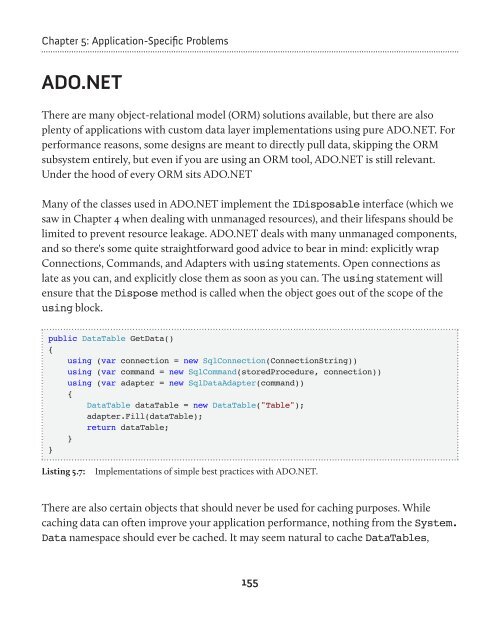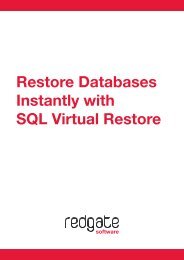Under the Hood of .NET Memory Management - Simple Talk
Under the Hood of .NET Memory Management - Simple Talk
Under the Hood of .NET Memory Management - Simple Talk
Create successful ePaper yourself
Turn your PDF publications into a flip-book with our unique Google optimized e-Paper software.
Chapter 5: Application-Specific Problems<br />
ADO.<strong>NET</strong><br />
There are many object-relational model (ORM) solutions available, but <strong>the</strong>re are also<br />
plenty <strong>of</strong> applications with custom data layer implementations using pure ADO.<strong>NET</strong>. For<br />
performance reasons, some designs are meant to directly pull data, skipping <strong>the</strong> ORM<br />
subsystem entirely, but even if you are using an ORM tool, ADO.<strong>NET</strong> is still relevant.<br />
<strong>Under</strong> <strong>the</strong> hood <strong>of</strong> every ORM sits ADO.<strong>NET</strong><br />
Many <strong>of</strong> <strong>the</strong> classes used in ADO.<strong>NET</strong> implement <strong>the</strong> IDisposable interface (which we<br />
saw in Chapter 4 when dealing with unmanaged resources), and <strong>the</strong>ir lifespans should be<br />
limited to prevent resource leakage. ADO.<strong>NET</strong> deals with many unmanaged components,<br />
and so <strong>the</strong>re's some quite straightforward good advice to bear in mind: explicitly wrap<br />
Connections, Commands, and Adapters with using statements. Open connections as<br />
late as you can, and explicitly close <strong>the</strong>m as soon as you can. The using statement will<br />
ensure that <strong>the</strong> Dispose method is called when <strong>the</strong> object goes out <strong>of</strong> <strong>the</strong> scope <strong>of</strong> <strong>the</strong><br />
using block.<br />
public DataTable GetData()<br />
{<br />
using (var connection = new SqlConnection(ConnectionString))<br />
using (var command = new SqlCommand(storedProcedure, connection))<br />
using (var adapter = new SqlDataAdapter(command))<br />
{<br />
DataTable dataTable = new DataTable("Table");<br />
adapter.Fill(dataTable);<br />
return dataTable;<br />
}<br />
}<br />
Listing 5.7: Implementations <strong>of</strong> simple best practices with ADO.<strong>NET</strong>.<br />
There are also certain objects that should never be used for caching purposes. While<br />
caching data can <strong>of</strong>ten improve your application performance, nothing from <strong>the</strong> System.<br />
Data namespace should ever be cached. It may seem natural to cache DataTables,<br />
155











